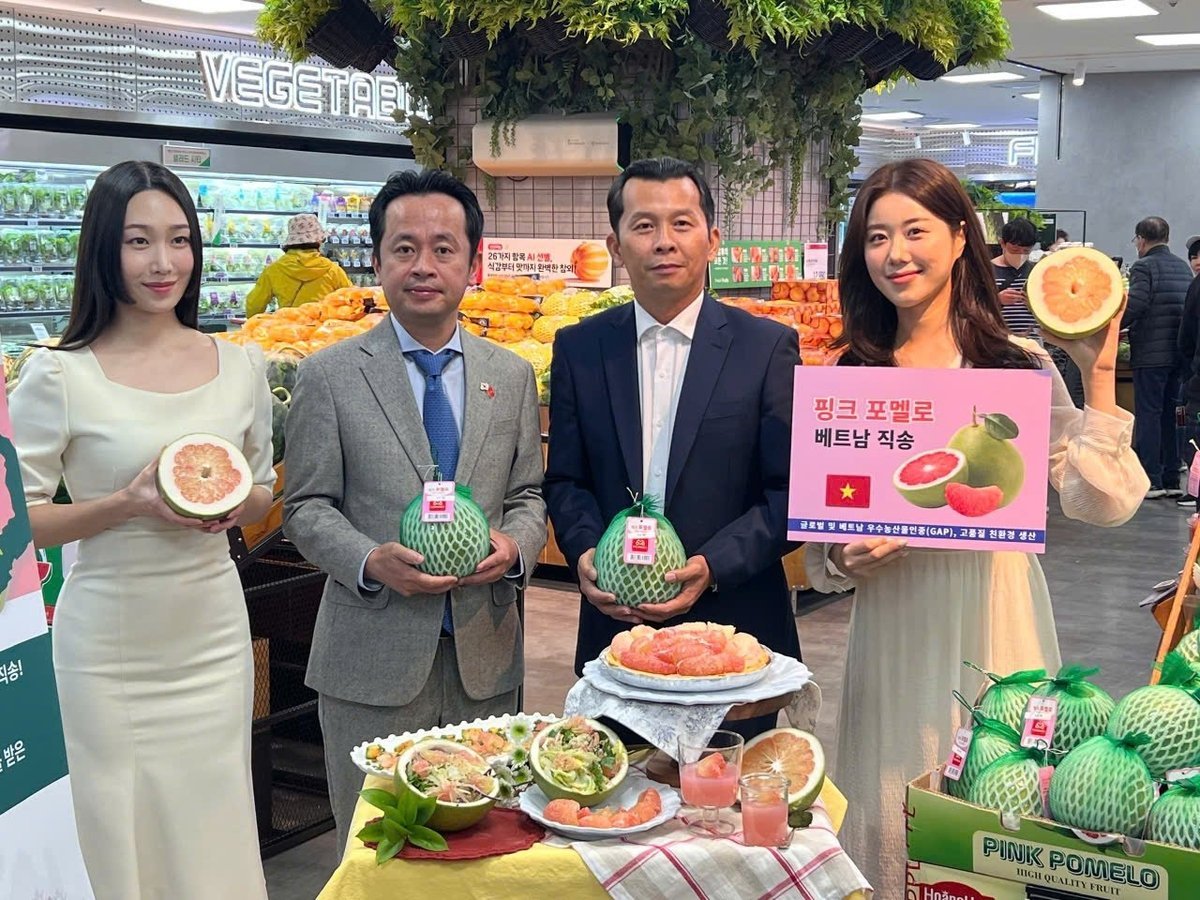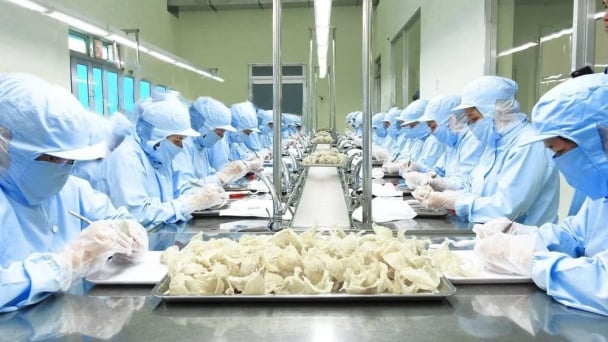May 16, 2025 | 08:13 GMT +7
May 16, 2025 | 08:13 GMT +7
Hotline: 0913.378.918
May 16, 2025 | 08:13 GMT +7
Hotline: 0913.378.918
The historic milestone has demonstrated the superior quality of Vietnamese agricultural products. Furthermore, the presence of Vietnamese pomelos in the South Korean market affirms the ongoing efforts of local businesses and authorities to promote bilateral economic cooperation between the two countries.
The event saw the participation of many key figures, including Pham Khac Tuyen, First Secretary in charge of the Vietnam Trade Office in South Korea; Dao Trong Tien, Third Secretary of the Vietnam Trade Office in South Korea; representatives from Hoang Huy One Member Limited Liability Company, the pioneering exporter of Vietnamese pomelos to the South Korean market; and senior leaders from Lotte Mart, one of South Korea's leading retail corporations.

Vietnamese pomelos at Lotte Mart in South Korea.
The event also provided an opportunity for all parties to reflect on the journey of introducing Vietnamese pomelos to South Korean consumers, in addition to discussing prospects for expanding market presence in the near future.
As of the end of 2024, South Korea was Vietnam’s third-largest trading partner, following China and the United States. Bilateral trade turnover between the two countries reached approximately 82 billion USD in 2024, marking an increase of 7.4 percent compared to the previous year.
Key Vietnamese exports recorded notable growth in the South Korean market, despite negative impacts from the global economic recession. Notably, Vietnamese coffee exports achieved a total value of 141 million USD, an increase of 22 percent; seafood 810 million USD, an increase of 2 percent; and fresh fruits and vegetables 319 million USD, an increase of 40 percent.
According to data from the Korea Rural Economic Institute (KREI), South Korea’s value of fresh fruit imports reached a record high of 1.45 billion USD in 2024, marking an increase of 20.1 percent compared to 2023. This level of increase reflects the market’s growing dependence on imported fruit, amid challenges in domestic production due to adverse weather conditions and climate change.
Experts forecast that South Korea’s fruit imports will continue to exhibit strong growth in the near future. KREI estimates that the total volume of fruit imports—including fresh, dried, and frozen varieties—will increase by 6.8 percent to 817,000 tons in 2025.
At present, South Korea ranks as the fifth-largest fruit export market for Vietnam, after China, the United States, the European Union, and Japan. With high-quality produce, Vietnam's annual fruit output exceeds 12 million tons (according to the Ministry of Agriculture and Environment), including nearly 1.2 million tons of pomelos. These figures demonstrate the significant potential for expanding Vietnamese exports to the South Korean market.
South Korean consumers are increasingly favoring nutrient-rich tropical fruits, creating an opportunity for Vietnamese pomelos to compete with products from the United States (oranges and apples) and Thailand (durian and rambutan). The average export price of Vietnamese pomelos to South Korea is 2.4 USD per kilogram, which is 30 percent higher than the price of 1.8 USD per kilogram in China, indicating the added value offered by the South Korean market.
According to the Department of Crop Production and Plant Protection under the Ministry of Agriculture and Environment, Vietnam began negotiating market access for pomelos in South Korea in 2018. However, the process only gained significant momentum after COVID-19.
Following two years of active discussion, pest risk analysis, and several rounds of technical negotiations, the Department reached an agreement on import technical requirements with the South Korean Animal and Plant Quarantine Agency in April 2024.
After August 2024, Vietnamese pomelos received official approval for import into South Korea, under the condition that each shipment undergo sample testing before customs clearance. In September 2024, Hoang Huy Company successfully exported the first shipment of five tons of pomelos, marking the beginning of a strategy to position the fruit as a key product in the South Korean market. For 2025, Hoang Huy aims to export 500 tons of pomelos, with a projected total value of 1.2 million USD (approximately 30 billion VND).
A representative from Lotte Mart has praised the potential of Vietnamese pomelos, citing their mildly sweet flavor, high vitamin C content, and suitability for the taste of South Korean consumers. After distributing the first shipment at the Lotte Mart Jamsil branch, the retail group plans to expand distribution to other branches if market response proves favorable.
This event will encourage Vietnamese businesses to invest in processing technology, enhance product quality, build brand identity, and improve competitiveness in the international market.
Translated by Nguyen Hai Long

(VAN) Japan's efforts to lower the price of rice through the release of its stockpile may finally be making some progress, albeit at a snail's pace.

(VAN) U.S. tariffs are not only a 'shock', but also an opportunity for Vietnamese businesses to renew their mindset toward comprehensive development.

(VAN) As Bac Giang lychee enters the harvest season, Minister Do Duc Duy expects that the fruit will contribute greatly to agricultural exports due to standardized production and deep processing.

(VAN) Consumers have shown a preference for free-range eggs, but those farming systems are more vulnerable to biosecurity risks like bird flu.
/2025/05/09/5701-1-184335_301.jpg)
(VAN) Vietnam’s eel exports nearly doubled thanks to a mud-free farming model, opening up new prospects while still facing numerous barriers related to international standards.

(VAN) Minister Do Duc Duy warned that if production is not professionalized and supply chains are not transparent, the U.S. market could become a growth bottleneck.

(VAN) Delegating surveillance responsibilities to local authorities is a cost-saving and efficiency-boosting measure that removes a key bottleneck for enterprises, according to Director General Duong Tat Thang.